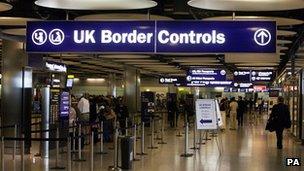UK asylum seekers 'told to prove they are gay'
- Published

MPs complained about a backlog of asylum cases
Gay and lesbian people seeking asylum in the UK from persecution abroad are being ordered to "prove" their sexuality, MPs have said.
In extreme cases claimants had handed over photographic and video evidence of "highly personal sexual activity" in an effort to persuade officials, the Home Affairs Committee found.
The gay rights group Stonewall called the testing system "distressing".
The Home Office promised to monitor and maintain standards.
In its report on the asylum system, the committee said it was concerned by the quality of the UK Border Agency's decision-making, as 30% of appeals against initial decisions had been allowed in 2012.
And a backlog of 32,600 asylum cases that should have been resolved in 2011 was yet to be concluded, while the number of applicants still waiting for an initial decision after six months had risen by 63% last year.
Archive: Speaking in February, one gay asylum seeker recounts their story
'Absurd'
Some had been waiting up to 16 years, while the housing with which they were provided was sometimes "appalling".
It also said poor decision-making by officials was raising the risk of the UK harbouring war criminals.
The committee also focused on the situation facing lesbian, gay, bisexual, transgender and intersex (LGBTI) people seeking asylum.
In its report, the committee said they faced "extraordinary obstacles" in persuading immigration officers of their case.
Its chairman, Labour MP Keith Vaz, told BBC News: "It is absurd for a judge or a caseworker to have to ask an individual to prove that they are lesbian or gay, to ask them what kind of films they watch, what kind of material they read.
"People should accept the statement of sexuality by those who seek asylum. This practice is regrettable and ought to be stopped immediately."
A Supreme Court ruling in 2010 stated that the "underlying rationale" of the United Nations Refugee Convention was that people should be able to "live freely and openly" in their own country without fear of persecution.
This judgement, the committee said, had effectively overturned the Border Agency's previous emphasis on "voluntary discretion" - which had meant it should be seen an option for claimants to conceal their sexuality in order to avoid abuse.
'Weakness'
The report said: "The battleground is now firmly centred in 'proving' that they are gay. In turn, this has led to claimants going to extreme lengths to try and meet the new demands of credibility assessment in this area, including the submission of photographic and video evidence of highly personal sexual activity to caseworkers, presenting officers and the judiciary."
The committee said: "We were concerned to hear that the decision making process for LGBTI applicants relies so heavily on anecdotal evidence and 'proving that they are gay'."
It added that "it is not appropriate to force people to prove their sexuality if there is a perception that they are gay. The assessment of credibility is an area of weakness within the British asylum system.
"Furthermore, the fact that credibility issues disproportionately affect the most vulnerable applicants - victims of domestic and sexual violence, victims of torture and persecution because of their sexuality - makes improvement all the more necessary."
The Refugee Council said the committee's report reflected its "grave concerns" about the UK asylum system.
Chief Executive Maurice Wren said: "Failing to treat asylum seekers with dignity and, simultaneously, failing to deal effectively and fairly with their claims has created an expensive and counter-productive bureaucratic nightmare that all too often denies vulnerable people the protection from persecution and oppression they desperately need."
Stonewall says LGBTI people in some countries have suffered rape, torture and death threats.
Spokesman Richard Lane said: "Being gay isn't about what nightclubs you go to; it is a fundamental part of who you are.
"Sadly, in far too many cases, valuable time is spent attempting to 'prove' a claimant is gay in this way rather than establishing whether they have a legitimate fear of persecution.
"This is not only a waste of time and resources but can be deeply distressing to asylum seekers, many of who have fled for fear of their lives."
A Home Office spokesman said: "The UK has a proud history of granting asylum to those who need it. We are committed to concluding all cases as quickly as possible, but asylum cases are often complex and require full and thorough consideration.
"We have robust mechanisms in place to monitor standards of housing provided to asylum seekers."
He added: "We will continue to monitor performance to ensure that standards are met."
- Published10 October 2013
- Published10 October 2013